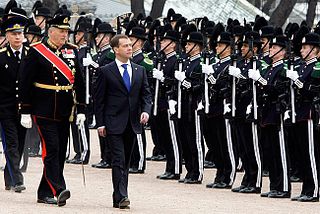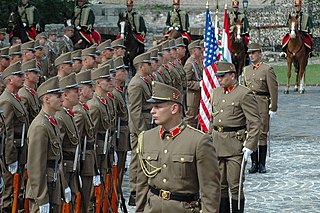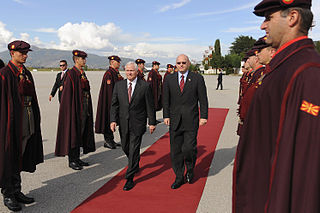
A military band is a group of personnel that performs musical duties for military functions, usually for the armed forces. A typical military band consists mostly of wind and percussion instruments. The conductor of a band commonly bears the title of bandmaster or music director. Ottoman military bands are thought to be the oldest variety of military marching bands in the world, dating from the 13th century.

A state visit is a formal visit by a head of state to a foreign country, at the invitation of the head of state of that foreign country, with the latter also acting as the official host for the duration of the state visit. Speaking for the host, it is generally called a state reception. State visits are considered to be the highest expression of friendly bilateral relations between two sovereign states, and are in general characterised by an emphasis on official public ceremonies.

In some militaries, foot guards are senior infantry regiments. Foot guards are commonly responsible for guarding royal families or other state leaders, and they also often perform ceremonial duties accordingly, but at the same time are combat soldiers.

Guard mounting, changing the guard, or the changing of the guard, is a formal ceremony in which sentries performing ceremonial guard duties at important institutions are relieved by a new batch of sentries. The ceremonies are often elaborate and precisely choreographed. They originated with peacetime and battlefield military drills introduced to enhance unit cohesion and effectiveness in the late 17th and early 18th centuries.

A military parade is a formation of soldiers whose movement is restricted by close-order manoeuvering known as drilling or marching. Large military parades are today held on major holidays and military events around the world. Massed parades may also hold a role for propaganda purposes, being used to exhibit the apparent military strength of a country.

The King's Colour Squadron, formerly the Queen's Colour Squadron, is the unit of the Royal Air Force charged with the safe-keeping of the King's Colour for the Royal Air Force in the United Kingdom. Since its formation, it has been formed exclusively by Officers and Gunners of No. 63 Squadron RAF Regiment.

Beating Retreat is a military ceremony dating to 17th-century England and was first used to recall nearby patrolling units to their castle.

The SAF Military Police Command is the military police formation of the Singapore Armed Forces (SAF). Established as the Singapore Armed Forces Provost Unit (SAFPU) in 1966, its primary role is to police duties to uphold standards of discipline within the SAF, and to provide security coverage for key SAF military installations and the Ministry of Defence (MINDEF) headquarters at Bukit Gombak.

A guard of honour, honor guard or ceremonial guard, is a group of people, typically drawn from the military, appointed to perform ceremonial duties – for example, to receive or guard a head of state or other dignitaries, the fallen in war, or to attend at state ceremonials, especially funerals. In military weddings, especially those of commissioned officers, a guard, composed usually of service members of the same branch, form the sabre arch. In principle, any military unit could act as a guard of honour. In some countries, certain units are specially assigned to undertake guard of honour postings or other public duties. Republican guards, royal guards and foot guards frequently have ceremonial duties assigned to them.

The goose step is a special marching step which is performed during formal military parades and other ceremonies. While marching in parade formation, troops swing their legs in unison off the ground while keeping each leg rigidly straight.

The Mauritius Police Force (MPF) is the national law enforcement agency of Mauritius. The MPF carries out police, security, and military functions on Mauritius, with about 12,500 police officers under the command of the Commissioner of Police. The MPF is part of the Home Affairs Division, which operates under the aegis of the Prime Minister's Office.

The Ceremonial Guard Battalion, also known as the Honour Battalion is a military unit of the Macedonian Military. The mission of the Ceremonial Guard Battalion is to perform military honors for all events regulated by the rules of engagement in ARNM, as well as maintaining the combat readiness of the Ceremonial Guard Battalion units at the highest level.

The State President's Guard was the previous name of the National Ceremonial Guard, a guard unit for the South African State President and guard of honour at ceremonial occasions.

The Beijing Garrison Honor Guard Battalion, officially the PLA Honour Guard, is a ceremonial honour guard and specialised unit of the People's Liberation Army (PLA). It is composed of representatives of the People's Liberation Army Ground Force, Navy, and Air Force. Male soldiers in the battalion must be at least 180 cm tall, while females must be at least 173 cm tall. This honor guard battalion, while reporting directly to the Central Military Commission, falls under the operational control of the Central Theater Command. During parades, the battalion is led by a color guard detail bearing the PLA flag, a tradition which began in 1981.

The Michael the Brave 30th Guards Brigade is a primarily ceremonial, as well as combat unit of the Romanian Armed Forces established in 1990. The Brigade also has a military music band, a drill team detachment, and an artillery battery. The military police unit of the Brigade guards certain special objectives of Bucharest. The Brigade traces its origins to the 1st Tirailleur Battalion, later Vânători Battalion, which was established in 1860.

The Representative Regiment of the Polish Armed Forces is an Honor Guard unit of the Polish Armed Forces, of regimental size. It performs public duties for the armed forces and the President of Poland throughout the Warsaw Capital Garrison region and acts as the main drill and ceremony unit for the military. It performs during the annual Armed Forces Day parade on Ujazdów Avenue, during state arrival ceremonies at the Presidential Palace and alongside other honor units at the National Independence Day ceremony. The regiment has been described by President Andrzej Duda as one of "the best-drilled and organised formations in the world".

The Honor Guard Company of the Minsk Military Commandant is an honor guard unit of the Armed Forces of Belarus.

The United States Navy Ceremonial Guard is the official ceremonial unit of the United States Navy. It is responsible for the performance of public duties in the U.S. Navy. The guard is composed of 200+ enlisted navy personnel. It is based at the Naval District Washington, Washington Navy Yard, Washington D.C. It is currently led by Commander Alexander McMahon.

There are currently 9 main military bands currently belonging to the South African National Defence Force (SANDF), which represent the different branches of the SANDF and providing music on ceremonial occasions. Since military bands were introduced in the country, they have played a prominent role in public and military life. Pipe bands also play an important role in South African military music, with notable pipe bands coming from the Cape Town Highlanders, Transvaal Scottish Regiment and the South African Military Health Service. Military bands of the SANDF are also affiliated with the police bands of the South African Police Service. In addition to military music, military bands in the SANDF perform different genres, including classical, jazz, pop and light music.

The 32nd Budapest Guard and Ceremonial Regiment of the Hungarian Defence Forces is a ceremonial infantry unit in the Hungarian military, headquartered in the capital of Budapest. It is under the direct supervision of Budapest Garrison Brigade "Vitéz Sándor Szurmay" of the HDF General Staff. Aside from its ceremonial duties, the soldiers of the regiment, along with its historical predecessors, have been involved in 14 wars, 135 battles, and 6 United Nations and NATO missions.
































